In Part 1 you learned to look past your eyes and in Part 2 of working around your Paleolithic mind, you found out your brain prefers efficiency, often at the expense of time-consuming logic. Today, in final post in this series, you’ll find out how to be wrong but still right; while at the same time turning your brain into a virtual casino of travel gains.

Dissing Cognitive Dissonance
You’re always right. At least, according to your own brain. Cognitive dissonance, a fancy term to describe that familiar state we find ourselves in when we hold two conflicting beliefs. Those conflicts can come about when we’re exposed to new information or challenges in life. Sitting around mulling why you made a mistake for days isn’t very useful when there are foods to scavenge and large animals that want to eat you.
For example, let’s say you really want to go to Morocco, but know it will take 3 months of saving to do so. Instead, you go out every weekend, blowing the money you were saving on one too many beers.
3 months later, you haven’t gone anywhere. To alleviate the guilt and perhaps embarrassment at the failure, your brain kicks into action.
Take a deep breath, you’ll be right at the end of this.
Cognitive dissonance is a complex state but shortly there are two major ways it’s resolved in the brain.
- Rationalizing: Well, I did have fun and not taking a trip this year isn’t so bad. I mean, I like that bar a lot and drinking is a good time so it was a decent trade off. Besides, Morocco is hot this time of year.
- Dismissing: Morocco is hot and it’s not like I wanted to go there that badly. It will always be there, besides I’ve heard it’s not that great.
Your brain is trying to alleviate all of the negative feelings you have about not accomplishing your goal. Yet, when you admit to yourself you’ve failed, that same mental defense can work in your favor by making you feel positive about a second attempt. The first time was a bust but you’ll get to Morocco, avoid the guilt by having a few quiet weekends, and save your party for Marrakesh. Being right all the time has it’s perks, you know.
 Old Brain Over New Brain
Old Brain Over New Brain
The older systems in our brains tend to take priority over our (newer) higher functions located primarily in the frontal lobe right behind your forehead. That means your emotions can, literally, get the best of you despite all what the facts to tell you. The stronger you feel about something (positive or negative) the less emphasis your brain puts on raw data.
- Driving to the airport is far more dangerous than flying around the world – but who cares, falling 10,000 meters to a fiery death is much scarier. (At least in your head. Although you’re scared right now and probably won’t listen, 76.6% of people survive plane crashes.)
It goes along with your imagination, emotions heighten your ability to visualize leading to more vivid memories real or otherwise. Most of you probably don’t dream about numbers and spreadsheets at night or have an emotional response to them (aside from dread). Our brains don’t like risk – at least when there’s a perceived loss.
The Ultimate Cave-Brain Shortcut
That is perhaps our biggest Paleolithic shortcut, one that’s easy to manipulate, and the most fun to implement.

We don’t like risk but are willing to throw all the rules out the door for a potential gain. You won’t be able to trick, coerce, or coax yourself into traveling to all the places you want unless you see some value in it. People who try to convince you the world is scary, or traveling is frivolous, do so because they don’t see the gain of expense. Without the experiences themselves to visualize being in your traveling shoes.

Paleolithic brain isn’t all bad however, millions of years of evolution has made our species quite adept at recognizing patterns (like languages) quickly, honed our social instincts to avoid danger, and embedded nomadic tendencies in our DNA. Human beings are the only species to inhabit all 7 continents (except foxes) and can be found adapted to all of our planet’s land environments because someone – maybe your ancient cousin – decided to step out and see what was beyond the next hill.
Fortunately for you, their genes are still floating around in your cells. The rest, is up to you.
[photos by: Brent Danley (hominid skulls), hurleygurley (Jell-O brain)]












So basically you have to fool yourself into finding the benefits to avoid talking yourself out of taking action? Does it work if you know you are fooling yourself? That alone could produce more cognitive dissonance. Food for thought, indeed.
You have to see the benefits; not fooling yourself though. It’s like the glass half-full thing but we can cheat by finding supportive social groups and visualizing ourselves doing the things we want.
Generally, when traveling is the outcome of a state of cognitive dissonance, after you’re trip you’ll be sure it was worth it. Brain kicking in to make sure you feel like the right decision was made.
Our minds are certainly tricky things 🙂 Though adapted mainly to help us survive, which doesn’t always make them as practical when it comes to other (more) modern dilemmas.
Fascinating series, Anil, which produces some cognitive dissonance of its own. 🙂
oh man… my brain hurts after reading this series LOL… but you’re right “We don’t like risk but are willing to throw all the rules out the door for a potential gain.”
Risk has always been an uncomfortable and troublesome thing to do and we only do it if the gain is way better than we currently have….
haha, it was an intense 3-parter!
“We don’t like risk but are willing to throw all the rules out the door for a potential gain.” < There are so many great tests and examples to demonstrate how bad we are at evaluating things logically. Here's a good example from schneier.com/essay-155.html -Quote- * Alternative A: A sure gain of $500. * Alternative B: A 50% chance of gaining $1,000. The other group was given the choice of: * Alternative C: A sure loss of $500. * Alternative D: A 50% chance of losing $1,000. These two trade-offs aren't the same, but they're very similar. And traditional economics predicts that the difference doesn't make a difference. -End quote- 87% of people choose alternative A. More food for thought 🙂
Thanks for the series Anil!
In the past few years I’ve been reading a lot about how the brain functions, especially in regard to how to think effectively to succeed, how to take advantage of the way the brain functions so that your brain empowers you to succeed (in anything you want) rather than let it stop you/ disempower you. Very interesting stuff!
It was interesting and informative to have you explain the brain functioning in terms of travel success / failure (i.e. you dont’ do it vs you do )
Thanks ! cheers, Lash
It’s all between our ears 🙂 The brain is the most complex computer in our known universe; such a powerful tool that wielding it takes time, practice, and understanding. Good thing for us, it’s usually cooperative when given the right input.
Very interesting series, Anil. In our society, most people choose unhappiness over uncertainty to avoid risk. We often look at an option and imagine the possible outcomes, from the worst possible (like our plane falls out of the sky) to what we hope the experience will be like. What we fail to consider is the top of the scale – things could be exponentially better than we’ve hoped for (you find a winning lottery ticket or meet the love of your life, for example). Hey, it’s probably more likely than your plane falling out of the sky! When you look at the complete range of outcomes, the decision to take the risk become easier.
Such a wonderful point about looking at both extremes; using your brain’s own logic against it in a sense. Yes, your plane may crash but the love of your life could also sit down next to you on the flight. I love that example!